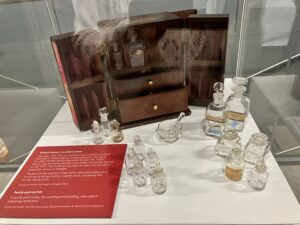
Naval surgeon William Beatty’s medical chest at Royal Museums Greenwich
Previously, I proposed to say a little about some eighteenth century medications (or ‘physic’) and what they were used to treat. This task isn’t entirely straightforward, because these remedies weren’t developed using our modern scientific method and theory. They were often applied the way they were because they were perceived to work. You can debate whether they worked because of placebo effect, or if the patient’s symptoms resolved in spite of any medical treatment, or if they were actually effective… I suspect the results were sometimes a combination of the three.
I’ve always been intrigued in the way we took care of people who were unwell before the advance of modern pharmacology, and in this case my interest was initially piqued by the inclusion in Admiral Nelson’s purported medicine chest of a bottle labelled ‘Ether.’
Ether was not used in the eighteenth century in the way we understand it best; it wasn’t used as an anesthesia during surgery until 1840, by a Boston dentist. Whatever was in that bottle must have been a liquid form of the chemical compound, not a gas, and I presume it was fairly stable, although I don’t have enough scientific competence to confirm this – we don’t typically think of ‘ether’ as being stable! Anecdotally, it appears to have been used topically as a remedy for headache and by mouth for nausea, although I have not found explicit instructions for administering ether in contemporary sources. Naval surgeons, in their notes, generally only recorded that a particular medicine was employed, not how to employ it.
It is difficult to find references to ether in this form in print; it is not listed in either the recommended pharmacopeia of the Royal Navy, nor in the one listed in William Buchan’s Domestic Medicine of 1800 (Seventeenth Edition), although Buchan mentions it as a remedy for headache.
(I wrote an entire article about this, which was published in The Nelson Dispatch. It goes much further into detail but unless you really want to know those details, this is as far as I’ll go in this post. If you would like to know more, just email me and I will post it.)
If you find this topic interesting, I can continue to examine various eighteenth-century medicines in ongoing posts. Say, one medicine per month or so? Let me know!
To really understand eighteenth century medicine you need to know something about the medical theory of the time. How interested in that would you be — Galenic Theory and the four humors, and how physicians used them to diagnose disease? (It will probably make you very appreciative of your doctor!)